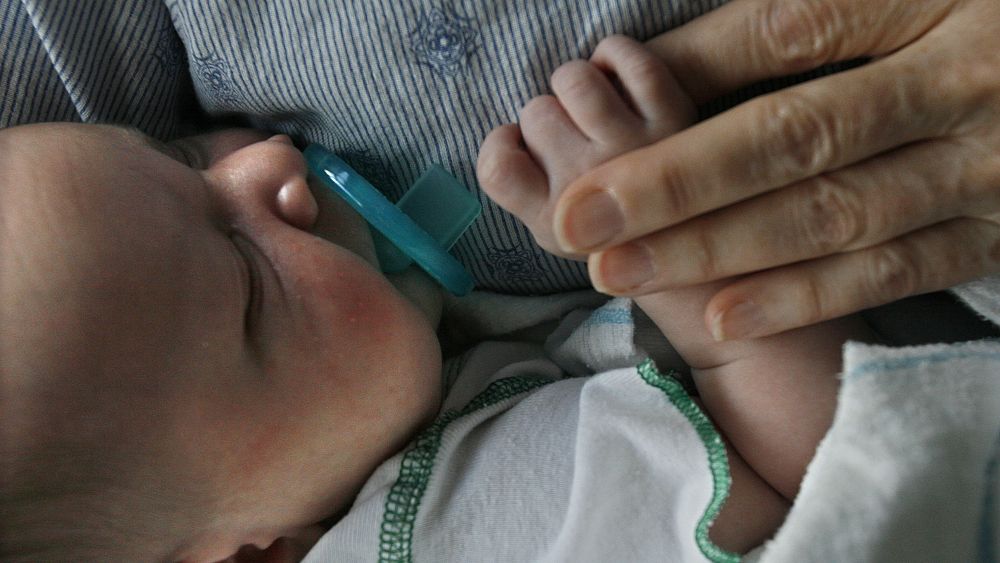Many parents are waiting to receive a new preventive antibody for their children to prevent them from getting bronchiolitis. Experts and officials say the product is a victim of its own success.
Isabelle, a 41-year-old mother living in France, has been waiting for a dose of the new preventive antibody nirsevimab for her two-month-old baby since it was first launched in mid-September.
Marketed as Beyfortus, it is the first widely available intervention to prevent severe disease caused by respiratory syncytial virus (RSV), a common infection that is a leading cause of pediatric hospitalizations in Europe.
Isabelle immediately received a prescription from her pediatrician, but her pharmacy in the Paris region received only 10 doses of the medicine despite requesting 30 in the first two weeks, she said.
She feels “very angry” because her son, born too early to benefit from the hospital-based administration of the antibody at birth, weighed too little to receive the highest dose of the drug (100 mg for children over 5 kg) in her pharmacy .
Her newborn is already sick with COVID-19, and she is worried about contracting RSV, which causes cold-like symptoms but can lead to bronchiolitis and be very dangerous for newborns and older adults.
Officials say the demand for this new antibody, authorized in the European Union last year, is unprecedented for non-mandatory preventive intervention.
The French government had ordered 200,000 doses of Beyfortus but, after launching an immunization campaign in September, the demand from parents was so high that, not even two weeks after the launch, they decided to reserve some doses for maternity wards to manage Beyfortus doses. stocks available.
The country's Ministry of Health said this was due to the “success” of the campaign, adding that preventive interventions like this typically have a much lower take-up rate.
A representative of the pharmaceutical company Sanofi, which together with AstraZeneca produces the Beyfortus antibody, confirmed that the compliance rate was abnormally high.
It was expected that 5 to 10 percent of people would want the medicine, but in France the figure was closer to 60 to 80 percent in some hospitals.
The company says there is no production issue but rather that the doses are based on each government's contracts since this is a new intervention.
So far the product has been launched in the United States, France and Spain, Sanofi said.
Contenuti
ToggleEffective prevention of diseases without treatment
Dr Rick Malley, professor of paediatrics at Harvard Medical School and doctor at Boston Children's Hospital in the US, told Euronews Next that there are two ways to protect people from infections.
One is to provide a vaccine to help a person's body prevent an infection, and the other is to provide an antibody that can immediately neutralize a virus. Beyfortus is a monoclonal antibody so it is directed against a specific RSV protein.
Another antibody that exists to protect children from RSV is palivizumab, marketed as Synagis, but requires monthly doses and does not last as long as Beyfortus.
“You don't have to give monthly shots, you just give one dose, one shot, and then the child is protected for the RSV season in clinical trials,” Malley said of the new intervention.
Beyfortus resulted in a 75.7% reduction in severe RSV in children younger than 12 months who received the antibody in phase III clinical trials.
There is optimism that it could help reduce hospital admissions as there are no effective drugs for RSV or bronchiolitis.
“Managing a child with RSV is supportive. That doesn't mean it isn't effective, but you are giving them oxygen and may need to help them breathe. Make sure they are well hydrated and that they are safe in the hospital setting,” Malley said.
The high demand pushes to give priority to some newborns
Caroline Combot, president of the French National Union of Midwives, told Euronews Next that she had spoken to many parents interested in the preventative intervention once it became available.
“The mothers I saw told me that when they were offered this, they immediately said yes because their first or second child had had severe episodes of bronchiolitis and they absolutely don't want to repeat that experience,” she said.
Combot added that health workers were also careful to tell parents that it was a “preventative treatment” rather than a vaccine, saying she thought it “played down” the medicine, making parents more willing to provide it to their children .
France also saw a “peak in births in September and October,” meaning there were more parents of newborns seeking doses of the antibody as it was distributed.
The government has focused its winter immunization campaign messaging on preventing the triple epidemic that many countries experienced last year, with COVID-19, influenza and RSV cocirculating during the winter season.
The focus on last year's borderline health services may also have led to high demand.
Now, the French government has reserved the smaller 50 mg dose of Beyfortus for children under 5 kg for maternity wards only.
“In an ideal world, if we could have treatment for everyone, that would be great, but we get feedback from some [maternity] services is in fact that they must give priority to some children [who are more at risk] compared to others,” Combot said.
In the United States, the limited supply of Beyfortus has prompted the Centers for Disease Control and Prevention (CDC) to recommend prioritizing the highest dose of Beyfortus (for infants weighing more than 5 kg) for newborns at risk of severe RSV disease, including infants younger than 6 months. and those with underlying conditions.
“It's stressful”
Parents in France are finding it difficult to understand why the high demand is not being met.
“The government has carried out a campaign [for the medicine] that it worked, and they are surprised that parents want to protect their children from bronchiolitis,” Isabelle said.
“They simply did not order enough doses, while it is easy to know the number of births and the age to receive this vaccine.”
Her concerns are similar to those of Clémence Bonnin, 33, whose twin daughters were born in July in the Loire region.
Bonnin's pharmacist never received the prescribed doses, but still hopes to receive some soon.
“I asked other pharmacies who told me they didn't have any,” he added. For Bonnin, it's worrying because her twins are in daycare with other children, so they could easily contract the virus.
“It's stressful because I saw that the epidemic threshold has already been exceeded in some regions of France. So I'm a little afraid that they'll get him and that it will end badly,” Bonnin said.
Most children around the world will contract RSV at some point in their first two years of life, and many adults will contract it later in the form of a cold, but until recently there weren't many preventative options , Malley explained.
But in addition to this monoclonal antibody for newborns, two new vaccines have been approved to prevent severe RSV. The vaccine Abrysvo it can also be given to pregnant women in the European Union to prevent newborns from contracting RSV.
“So we've gone from just Synagis, which was approved for children at high risk for RSV, and now we have all these other options on top of that and we're looking forward to seeing what their impact will be once they're rolled out across more large scale.” “Malley said.
Image:Getty Images







